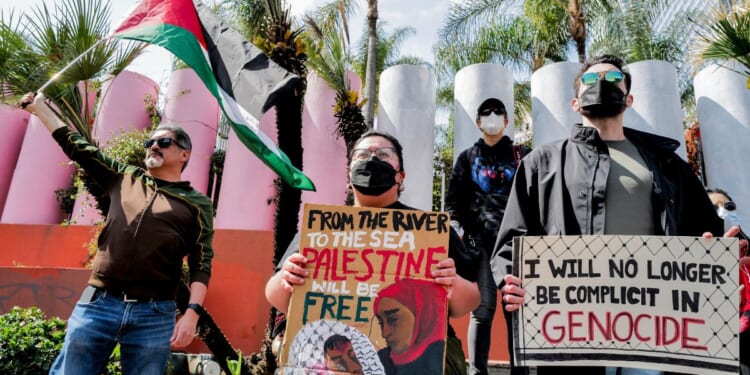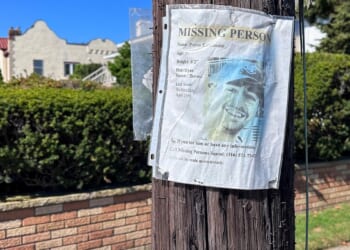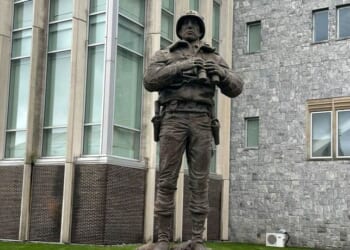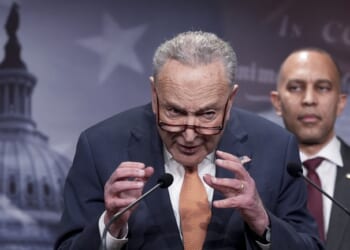In war, truth has always been the first casualty. In our time, it may also be the most powerful weapon.
On Nov. 2, the remains of three more Israeli hostages, including Israeli-American Omer Neutra, were returned from Gaza. It was a small mercy amid deep moral confusion.
President Donald Trump’s Gaza peace plan, announced in September, aimed to end the bloodshed through an immediate cease-fire and the return of all hostages.
Yet the cease-fire remains broken, the hostages are not all home, and Gaza continues to hover between anarchy and illusion.
The recent public executions of eight so-called collaborators with Israel carried out by Hamas following the partial retreat of the Israeli Defense Forces raised eyebrows about the willingness of the terrorist group to disarm and to give up control in the strip.
If Hamas continues to refuse to give up control in Gaza, the hopes for long-term peace would be in fumes, and a likely scenario would emerge in which the Gaza war would morph into a more hybrid model, where increasingly unconventional means would be deployed.
The United States, determined to prevent a complete collapse, has deployed senior officials and established a new military base in Israel’s Kiryat Gat.
But the deeper struggle is not over territory or tactics. It is a struggle over truth. The Gaza conflict has revealed a new front in modern warfare: the weaponization of language itself.
In the 21st century, wars are waged not only with drones, sanctions, and cyberattacks, but also with words. Bombs are no longer the only things that destroy nations — words do as well.
Terminology has become a frontline weapon in hybrid warfare, where the power to define events can be as decisive as a military victory.
The words “genocide,” “resistance,” “occupation,” and “terrorism” carry moral weight. These words shape how conflicts are understood. They influence global perception, determine legal outcomes, and define who is seen as the victim and who is seen as the aggressor.
In fact, few terms in contemporary geopolitics are as contested as “genocide.”
Raphael Lemkin, the Polish-Jewish lawyer who coined the word genocide in the aftermath of the Holocaust, believed that precise language could help humanity confront evil with moral clarity. He gave the world a vocabulary to describe its darkest impulses so that atrocities could never again be justified or ignored.
That clarity, however, has vanished.
And that is why to classify an event as genocide is to trigger legal obligations, mobilize international outrage, and redefine the legitimacy of the actors involved.
Yet the growing appropriation of this term by advocacy groups, NGOs, and state actors risks diluting its force. The term is now used carelessly by these groups and even governments to describe everything from legitimate counterterrorism operations to political grievances. When every atrocity is labeled a genocide, the word loses its potency, and the international community becomes paralyzed by semantic overload.
The overuse of this word dulls its power and paralyzes the international community in a fog of false equivalence.
Hybrid warfare thrives in this space of ambiguity. States and non-state actors manipulate language to control narratives — Russia, for example, describes its invasion of Ukraine as a “special military operation” to avoid both legal accountability and moral condemnation.
This distortion is vividly seen in the case of the Pennsylvania-based Lemkin Institute for Genocide Prevention. Founded in 2021, the institute has accused the United States of complicity in “genocide” while condemning Israel for targeting Hamas leaders, including Ismail Haniyeh, and even portrayed Hezbollah as a victim of Israeli “terrorism.”
It has published numerous reports on “Israeli genocide in Gaza,” quoting the Hamas-controlled sources, and even claimed that the brutal murder of Sarah Milgrim and Yaron Lischinsky in Washington by a pro-Palestinian activist might have been “a false-flag operation.”
The irony is staggering. In fact, none of this aligns with Raphael Lemkin’s moral intent, as the man who coined the very term “genocide” was one of the architects of the UN Genocide Convention, and he fought tirelessly to establish rigorous definitions and legal frameworks that could prevent mass atrocities.
His life’s work was rooted in precision and moral clarity. Today, what he envisioned as a tool for justice has been reduced to a political instrument in a global war of narratives.
For an organization to exploit his name in the service of politicized and selective accusations undermines those principles entirely.
Lemkin’s family has recently pursued legal action to challenge this distortion of his legacy — a reminder that the fight over words is as consequential as the fight over territory.
According to several reports, the family’s lawyers addressed Gov. Josh Shapiro and Pennsylvania’s Bureau of Corporations and Charitable Organizations, noting that the Institute “represents itself as an embodiment of Mr. Lemkin’s ideology,” while its “policies, positions, activities, and publications are anathema to Mr. Lemkin’s belief system.”
The fight over Lemkin’s legacy illustrates a deeper truth. The war for language is the war for reality. When activists and institutions twist definitions, they do not simply influence opinion — they alter the moral architecture of the world.
But this battle over words is not confined to the Middle East. During Trump’s first term, the United States declared China’s persecution of Uyghur Muslims in Xinjiang (East Turkestan) to be genocide. This marked a global precedent, and it was a designation that the Biden administration quietly chose to maintain.
The move was both a foreign policy milestone and a rare bipartisan success. China, predictably, rejected the label and described its campaign as “counterterrorism” to justify its repression in Xinjiang.
However, other governments — including the U.K., Canada, and the Netherlands — along with several human rights organizations, have likewise used the term “genocide” to describe China’s campaign against Uyghur culture.
In Iran, the violent suppression of women’s protests is presented as the “protection of cultural values.” Each of these examples underscores a global reality: Narrative control has become a form of geopolitical power. If you can rename evil, you can justify it.
Nowhere is this manipulation more dangerous than in the Israeli-Palestinian conflict, where language itself has become a battlefield.
In the Middle East, throughout the West, and globally, activists and Israel’s critics routinely and increasingly weaponize terms such as “apartheid” and “genocide” not only to condemn Israel, but also to reshape diplomatic debates in capitals across the West — all of this while ignoring Hamas’s strategy of embedding fighters and weapons among civilians, quite literally using them as human shields, and forcing innocent civilians to remain in their homes despite Israel’s warnings to evacuate areas that will be targeted to artificially drive up casualty statistics. Hospitals, schools, and mosques are even used as shields.
Israel has indeed caused civilian casualties in Gaza, but statistically at levels far lower than those of comparable Western military operations like those in Fallujah or Mosul during the Iraq War. One civilian death is too many, yet Israel argues that allowing Hamas to operate unchecked poses an existential security threat.
This debate becomes even more charged when some peace activists openly support Hamas or echo its extremist narratives.
Activists have organized rallies across Western capitals where chants such as “From the river to the sea, Palestine will be free” are used — phrases that align with Hamas’s stated goal of eliminating Israel altogether. There is no such thing as coexistence with Hamas in the picture.
Others, meanwhile, downplay Hamas’s violence by reframing it as “resistance” while avoiding acknowledgment of the group’s calls for the destruction of Israel or its treatment of women and other groups under strict Islamist codes.
Some academic institutions have justified the Oct. 7, 2023, Hamas terrorist massacres as “resistance” against “colonial oppression.”
When universities and advocacy groups frame terrorism as liberation, they cross the line from compassion into complicity. Human rights language, when applied selectively, ceases to defend humanity and contributes to the same dilution of moral clarity that undermines international law. It becomes an instrument of ideological warfare.
The danger of propaganda is that it does not merely distort perception; it reshapes policy.
Propaganda can be as destructive as bullets. When the international community adopts the vocabulary of extremists, it legitimizes their cause and erases the suffering of their victims. Calling Israel’s right to self-defense “genocide” while ignoring Hamas’s genocidal intent is not simply dishonest. It is destructive.
Hamas has repeatedly called for the destruction of Israel and the murder of Jews, presenting its vision of an Islamic society as a replacement for the state of Israel.
When activists, NGOs, or institutions adopt language that obscures these realities, they are not merely misusing words — they are actively shaping the battlefield.
The struggle over terminology is not just rhetorical. It is a form of hybrid warfare, determining how conflicts are understood, whose suffering is recognized, and which actors are deemed legitimate.
Raphael Lemkin envisioned a world where words could prevent atrocities. Today, the distortion of his legacy shows that words can just as easily enable them.
In today’s hybrid warfare, victory is no longer measured solely by military strength but by mastery over meaning. To name something — whether “genocide,” “apartheid,” or “counter-terrorism” — is to claim it. To redefine it is to erase it.
When terrorism becomes “resistance” and self-defense becomes “aggression,” moral gravity is turned upside down. Raphael Lemkin once hoped that the right words could save lives. His legacy now reminds us that the wrong words can destroy them.
The conflicts in Gaza, Xinjiang, and Ukraine are not only geopolitical battles. They are part of a broader civilizational struggle over truth itself. The question is no longer who controls land or borders, but who controls meaning.
The twentieth century was defined by industrial warfare. The twenty-first is defined by linguistic warfare. The dictionary has become a battlefield.
Those who care about freedom must reclaim it. The defense of truth begins not with weapons or sanctions, but with words that reflect reality. If we lose the meaning of words, we lose the foundation of everything worth defending.
The views expressed in this opinion article are those of their author and are not necessarily either shared or endorsed by the owners of this website. If you are interested in contributing an Op-Ed to The Western Journal, you can learn about our submission guidelines and process here.
Advertise with The Western Journal and reach millions of highly engaged readers, while supporting our work. Advertise Today.












